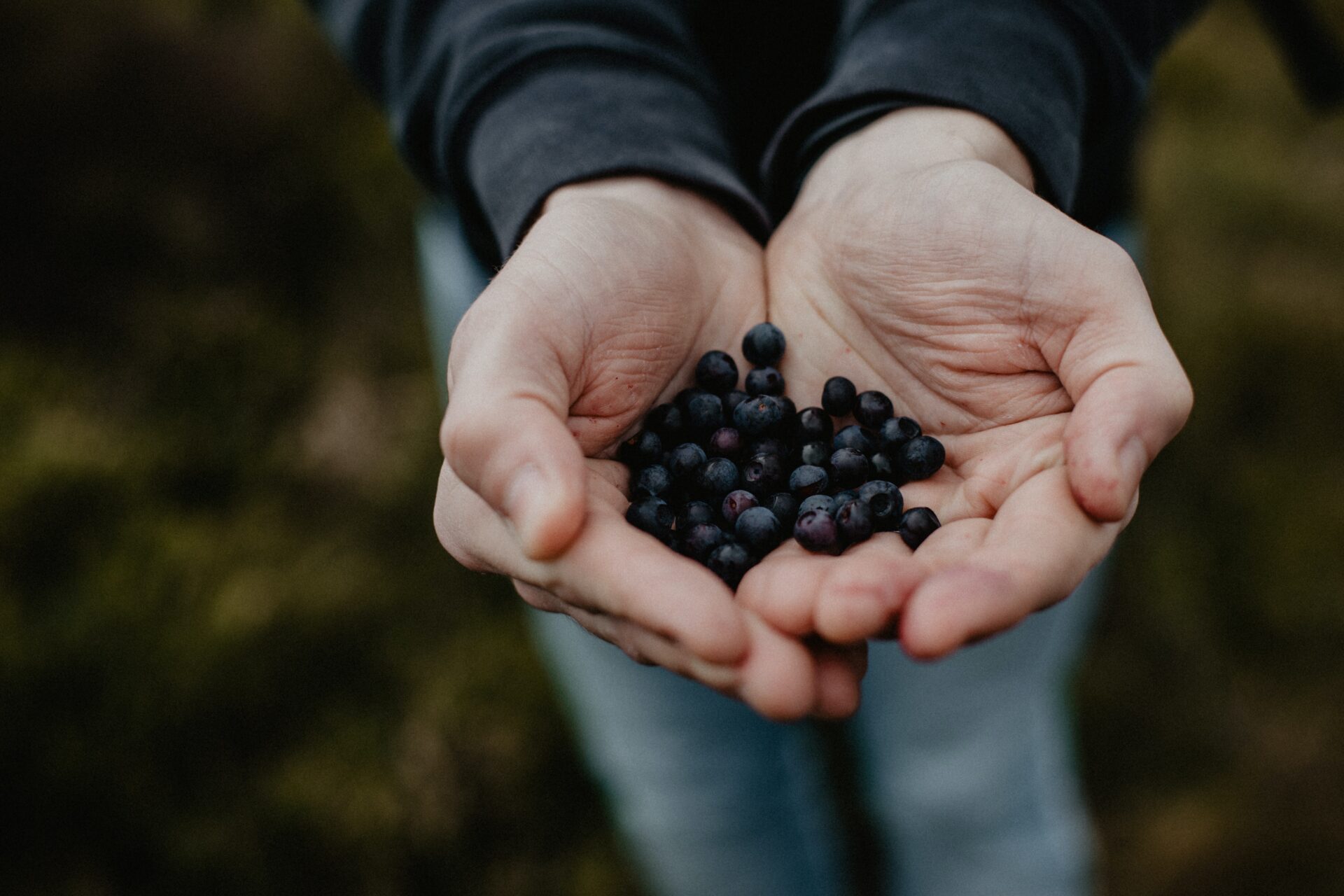
Hands holding wild blueberries.
Photo by Ben Jnr on Unspash
God’s garden: Foraging as spiritual practice
“Gathering and eating from God’s garden is our direct connection to the world that (God) made. Like love and beauty, no progress of science can make it obsolete.” –Samuel Thayer, The Forager’s Harvest[i]
Come spring in Wisconsin, when my neighbors start seeds inside and begin emerging into the yard again, working the dirt with hands and trowel, whispering excitement about the start of the gardening season, my thoughts go to the forest floor, and to wondering about what is emerging under the leafless canopy. For those who like to forage for wild foods, early spring is a particularly magical time of year. Here where I live, there is a brief window of weeks when you can find two of the most prized wild edibles at the same time—ramps and morels—along with as much nettle, watercress, garlic mustard, fiddleheads, and other rambunctious greens as you could want.
This year, in our excitement, we’ve gotten an early start. Two days after the last snow of the season, I brought my toddler to some local woods where she led me down the trail in search of ramps. The hepatica, bloodroot, and Dutchman’s breeches were open, their fragile white flowers belying the strength and hardiness it takes to be the first to bloom as the earth thaws. The mayapple, however, were still a ways away from bloom, folded up like closed umbrellas. Similarly for the ramps. After finding our first patch, and after deciding that they were too small to harvest, we sat down to marvel at these elegant, leafy spears rising from wet leaves and moss. We each picked one leaf to eat, as the bracing taste of spring worked its enlivening shiver through us. Given their size, my daughter called them “baby ramps,” not knowing yet that it takes seven years for a ramp to make it to this stage from seed, not knowing that the spring ephemerals like the hepatica and the ramps are perennials, and are among the oldest organisms in the forest, often much older than the trees.
Much has been made throughout history of the garden and gardening—as practice, archetype, and metaphor in philosophical, ethical, and religious thinking. Voltaire summarized the power of the garden as a guiding metaphor for life in the last line of Candide: “Let us cultivate our garden.” Garden as vocation, as haven, as refuge, as resource—it’s no wonder that so many of us turned or returned to gardening during the pandemic, leading to global seed shortages. But when I find myself off-trail, deep in the woods, stooped over a patch of ramps that found their way there without any help or thought from me, I wonder—what might foraging as spiritual practice and metaphor have to teach, that gardening, perhaps, might not?
We have been foraging, of course, for a lot longer than we have been gardening. For something like 2.5 million years, we fed ourselves through gathering and hunting, while we have been gardening and cultivating plants for about the last 10,000 years. Foraging is in this sense our oldest occupation on earth, our original vocation.
If Eden was a garden, it was not a raised bed in the backyard with tomatoes started inside from seed and with fencing to keep the rabbits out. Eden, the earth, creation itself, is God’s garden, where things grow where they grow (“mushrooms are where you find them,” as foragers say). The sacred mystery of life on this planet turns sunshine into an incredible array of plants as beauty, as medicine, as food, and as messengers of the givenness and abundance of this world. Foraging brings us into direct relationship with a world that we did not bring into being, that we do not control, a world that is not ours to plan and organize, but a world that we belong to, and that we belong in. Foraging invites participation in the landscape, relationality with many different species, an ethical summons to practice “the honorable harvest,” and a deep attunement and call to attention in the present moment, to the time and timing of when things happen.
As my daughter and I sit next to that patch of baby ramps, getting our first sweet, pungent taste of spring, I find myself wondering—what are we doing here, what am I doing when I’m foraging? I’m not gardening, and I’m not grocery shopping. I’m searching. I’m learning. I’m slowing down. I’m attuning. I’m creating connection and receiving relationship. I’m meditating in a way that sometimes leads to lunch on the plate. Remembering that what I’m tasting is a gift from God’s garden, I feel an awakening of all those nebulous nerve ends that spark for me what I mean by the spiritual, the religious, the sacred, the divine.
Although it was too early to take any ramps home with us, as we sat there, we noticed remnants of last year’s growth, with a cluster of little black seeds on a spent flower head. I gathered a few into my pocket, to add to the envelope of ramp seeds that I found last year. Maybe this year we will plant them, maybe alongside a particularly thin patch in the woods. This is what foraging does—it invites us into a relationship of gift to gift, abundance to abundance. In theological terms, foraging invites us to move from dominion to stewardship, and from stewardship to relationship and reciprocity. For in the end this world is God’s garden, and it is a gift and a grace—and a delicious taste—just to be a part of it.
The views expressed are those of the author and not necessarily those of American Baptist Home Mission Societies.


